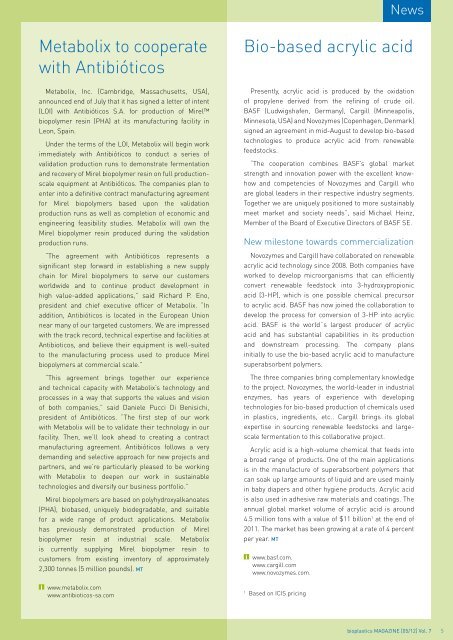bioplasticsMAGAZINE_1205
bioplasticsMAGAZINE_1205
bioplasticsMAGAZINE_1205
Create successful ePaper yourself
Turn your PDF publications into a flip-book with our unique Google optimized e-Paper software.
News<br />
Metabolix to cooperate<br />
with Antibióticos<br />
Metabolix, Inc. (Cambridge, Massachusetts, USA),<br />
announced end of July that it has signed a letter of intent<br />
(LOI) with Antibióticos S.A. for production of Mirel<br />
biopolymer resin (PHA) at its manufacturing facility in<br />
Leon, Spain.<br />
Under the terms of the LOI, Metabolix will begin work<br />
immediately with Antibióticos to conduct a series of<br />
validation production runs to demonstrate fermentation<br />
and recovery of Mirel biopolymer resin on full productionscale<br />
equipment at Antibióticos. The companies plan to<br />
enter into a definitive contract manufacturing agreement<br />
for Mirel biopolymers based upon the validation<br />
production runs as well as completion of economic and<br />
engineering feasibility studies. Metabolix will own the<br />
Mirel biopolymer resin produced during the validation<br />
production runs.<br />
“The agreement with Antibióticos represents a<br />
significant step forward in establishing a new supply<br />
chain for Mirel biopolymers to serve our customers<br />
worldwide and to continue product development in<br />
high value-added applications,” said Richard P. Eno,<br />
president and chief executive officer of Metabolix. “In<br />
addition, Antibióticos is located in the European Union<br />
near many of our targeted customers. We are impressed<br />
with the track record, technical expertise and facilities at<br />
Antibioticos, and believe their equipment is well-suited<br />
to the manufacturing process used to produce Mirel<br />
biopolymers at commercial scale.”<br />
“This agreement brings together our experience<br />
and technical capacity with Metabolix’s technology and<br />
processes in a way that supports the values and vision<br />
of both companies,” said Daniele Pucci Di Benisichi,<br />
president of Antibióticos. “The first step of our work<br />
with Metabolix will be to validate their technology in our<br />
facility. Then, we’ll look ahead to creating a contract<br />
manufacturing agreement. Antibióticos follows a very<br />
demanding and selective approach for new projects and<br />
partners, and we’re particularly pleased to be working<br />
with Metabolix to deepen our work in sustainable<br />
technologies and diversify our business portfolio.”<br />
Mirel biopolymers are based on polyhydroxyalkanoates<br />
(PHA), biobased, uniquely biodegradable, and suitable<br />
for a wide range of product applications. Metabolix<br />
has previously demonstrated production of Mirel<br />
biopolymer resin at industrial scale. Metabolix<br />
is currently supplying Mirel biopolymer resin to<br />
customers from existing inventory of approximately<br />
2,300 tonnes (5 million pounds). MT<br />
www.metabolix.com<br />
www.antibioticos-sa.com<br />
Bio-based acrylic acid<br />
Presently, acrylic acid is produced by the oxidation<br />
of propylene derived from the refining of crude oil.<br />
BASF (Ludwigshafen, Germany), Cargill (Minneapolis,<br />
Minnesota, USA) and Novozymes (Copenhagen, Denmark)<br />
signed an agreement in mid-August to develop bio-based<br />
technologies to produce acrylic acid from renewable<br />
feedstocks.<br />
“The cooperation combines BASF’s global market<br />
strength and innovation power with the excellent knowhow<br />
and competencies of Novozymes and Cargill who<br />
are global leaders in their respective industry segments.<br />
Together we are uniquely positioned to more sustainably<br />
meet market and society needs”, said Michael Heinz,<br />
Member of the Board of Executive Directors of BASF SE.<br />
New milestone towards commercialization<br />
Novozymes and Cargill have collaborated on renewable<br />
acrylic acid technology since 2008. Both companies have<br />
worked to develop microorganisms that can efficiently<br />
convert renewable feedstock into 3-hydroxypropionic<br />
acid (3-HP), which is one possible chemical precursor<br />
to acrylic acid. BASF has now joined the collaboration to<br />
develop the process for conversion of 3-HP into acrylic<br />
acid. BASF is the world´s largest producer of acrylic<br />
acid and has substantial capabilities in its production<br />
and downstream processing. The company plans<br />
initially to use the bio-based acrylic acid to manufacture<br />
superabsorbent polymers.<br />
The three companies bring complementary knowledge<br />
to the project. Novozymes, the world-leader in industrial<br />
enzymes, has years of experience with developing<br />
technologies for bio-based production of chemicals used<br />
in plastics, ingredients, etc.. Cargill brings its global<br />
expertise in sourcing renewable feedstocks and largescale<br />
fermentation to this collaborative project.<br />
Acrylic acid is a high-volume chemical that feeds into<br />
a broad range of products. One of the main applications<br />
is in the manufacture of superabsorbent polymers that<br />
can soak up large amounts of liquid and are used mainly<br />
in baby diapers and other hygiene products. Acrylic acid<br />
is also used in adhesive raw materials and coatings. The<br />
annual global market volume of acrylic acid is around<br />
4.5 million tons with a value of $11 billion 1 at the end of<br />
2011. The market has been growing at a rate of 4 percent<br />
per year. MT<br />
www.basf.com.<br />
www.cargill.com<br />
www.novozymes.com.<br />
1<br />
Based on ICIS pricing<br />
bioplastics MAGAZINE [05/12] Vol. 7 5


















